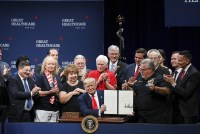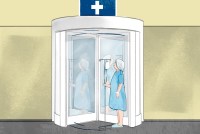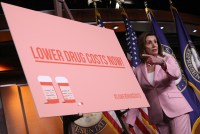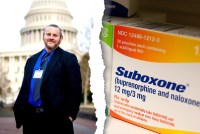Latest KFF Health News Stories
VCU Health Will Halt Patient Lawsuits, Boost Aid In Wake Of KHN Investigation
Patients at VCU Health will no longer be taken to court and can more easily get financial assistance to pay their bills.
Denuncian fraude a Medicare con aparatos ortopédicos a través de la telemedicina
Llaman por teléfono o aparecen en un chat y preguntan si el adulto mayor siente algún dolor. Luego le envían, en un caso, hasta 13 aparatos ortopédicos: rodilleras, cabestrillos, fajas. Facturan millones a Medicare.
Medicare Fraudsters Now Tap Telemedicine In Medical Equipment Scams
Scammers bent on defrauding Medicare are embracing the new technologies of remote diagnosis. Federal law enforcement is cracking down.
They Enrolled In Medical School To Practice Rural Medicine. What Happened?
Eight years ago, a new medical program opened in Salina, Kan., as an experimental way to promote rural medicine. Hailed as a solution to the rural doctor shortage, only three of its eight newly minted doctors are now working in the most rural communities.
Trump’s New Order For Medicare Packs Potential Rise In Patients’ Costs
The president’s directive, which he said is designed to give beneficiaries more choices in their health care, could lead to higher costs for seniors. Final rules are to be written by the Department of Health and Human Services.
Federally Funded Obria Prescribes Abstinence To Stop The Spread Of STDs
Obria, a Christian medical chain, was awarded federal family planning funds for its California clinics for the first time this year. Clinics receiving Title X funds are expected to treat and prevent sexually transmitted diseases. Obria’s prohibition against condoms means its prevention efforts rest on abstinence, even as STD rates surge.
KHN’s ‘What The Health?’: Trump Turns To Medicare
President Donald Trump, dogged by an impeachment inquiry, tries to change the subject by unveiling an executive order aimed at expanding the role of private Medicare health plans. The Trump administration also launched an effort this week to expand “wellness” programs aimed at getting people with insurance to practice better health habits – even though research has shown the efforts don’t generally improve health or save money. This week, Alice Miranda Ollstein of Politico, Kimberly Leonard of the Washington Examiner and Rebecca Adams of CQ Roll Call join KHN’s Julie Rovner to discuss these issues and more.
New Round of Medicare Readmission Penalties Hits 2,583 Hospitals
Starting today, Medicare is keeping half a billion dollars in payments from 83% of general hospitals for having too many patients come back.
Listen: Five Oklahoma Hospitals Collapsed – What Happened?
KHN Midwest correspondent Lauren Weber joined StateImpact Oklahoma reporter Jackie Fortiér to discuss why a series of rural hospitals collapsed, leaving hundreds of residents without jobs and their communities without lifesaving emergency medical care.
KHN Files Lawsuit To Force Feds To Disclose Medicare Advantage Audits
The Freedom of Information Act lawsuit could spur the Centers for Medicare & Medicaid Services to release audits that document up to $650 million in overcharges.
Sickened By Billing Abuses, Readers And Tweeters Stand Up For Patients’ Rights
Kaiser Health News gives readers a chance to comment on a recent batch of stories.
Insurers Test New Way To Cut Maternity Care Costs: Bundling
More insurers are experimenting with paying health care providers one lump sum to cover the cost of maternity care. Physicians and insurers hope the model — known as bundled payments — will help improve health outcomes.
Uber And Lyft Ride-Sharing Services Hitch Onto Medicaid
Ride-sharing companies promise better service for enrollees and lower costs for states. But the services are not for everyone on Medicaid.
In Tiny Doses, An Addiction Medication Moonlights As Treatment For Chronic Pain
Naltrexone, commonly used for opioid and alcohol use disorders, may also help patients with chronic pain — when prescribed in low doses. But few doctors or patients seem to know about it.
Conoce a los oficiales de salud que alertaron sobre la enfermedad del “vapeo”
La epidemia ha provocado indignación por la falta de supervisión federal sobre el “vapeo”, pero también hay una historia de éxito de salud pública local que contar.
Meet The Health Officials Who Alerted The World To The Alarming Vaping Illness
Without the teamwork, communication and quick action of several veteran health officials in Wisconsin, the world might not know about the vaping illness the U.S. is battling today. This is their story.
Hill Hodgepodge: Pelosi Draws From Democrats, GOP And Trump For Drug Plan
The House speaker announced her plan for lowering drug prices, which includes negotiations between drugmakers and federal health officials.
Doctors And Nurses With Addictions Often Denied A Crucial Recovery Option
Programs for health care professionals addicted to opioids generally bar a proven recovery method: the use of drugs like buprenorphine and methadone to relieve cravings.
Longtime Crusader Against OxyContin Begins To See The Fruits Of Her Struggle
Barbara Van Rooyan lost her son to the drug 15 years ago and has fought ceaselessly since then to hold Purdue Pharma accountable for its role in the opioid crisis.
Air Ambulances Woo Rural Consumers With Memberships That May Leave Them Hanging
State regulators and even one medevac company have raised doubts about prepaid subscriptions and promised benefits offered by air ambulance companies.
























